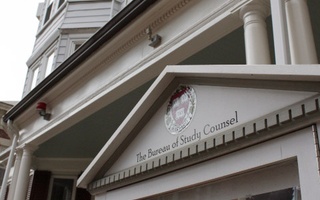As part of the implementation of recommendations released by the Student Mental Health Task Force last month, the Bureau of Study Counsel (BSC) now reports directly to the Director of University Health Services (UHS).
The Task Force interim report recommended that services at the BSC and UHS be organized as a unified spectrum, rather than two isolated, possibly intersecting, clusters. It suggested placing them under a single administrator as a way to partially achieve this—though the BSC will continue to function as a separate entity.
The new position will serve as an intermediary between the BSC and UHS, and will report to UHS Director David S. Rosenthal ’59 on clinical issues and Dean of the College Benedict H. Gross ’71 on student life issues.
While searching for a director of University counseling, academic support and mental health services, Rosenthal will begin a comprehensive analysis of staff and services at the BSC.
“My sense is what Dr. Rosenthal wants to do is simply find out what are the services that are provided there now, what do kids come in asking for, how many come in for academic assistance, how many for counseling assistance, broadly defined,” Task Force Chair Dr. Paul J. Barreira said. “We want to get a sense of the volume of work that’s going on there.”
Barreira said that this change fits well with the overall aims of the interim report.
“The provost and the dean have accepted and started to implement all of these interim recommendations, all four,” Barreira said. “Any one activity has to be understood in the whole context.”
The interim report called for a central administrator, closer integration of the two services, more mental health clinicians and improved approachability of services, including maintaining the BSC as a non-stigmatized portal of entry.
The BSC’s new reporting relationship with Rosenthal, which was implemented last Thursday, will not immediately alter services offered at the BSC.
“The students hopefully won’t see any changes,” Rosenthal said. “We’re going to see how we can better implement the relationship between the BSC and the UHS so we’re more synergistic in our solutions. One and one equals three rather than one and one equals two.”
The task force interim report stressed the importance of maintaining the BSC as a separate entity for students to use in seeking mental health care.
“It would be a mistake to think that the Bureau has now disappeared and that it is now a part of UHS,” Barreira said.
But he said that the new reporting structure will facilitate coordination.
“We want an array of services where everyone is working together,” Barreria said.
He said that services at the BSC would probably not be changed until the new administrator has a chance to examine it.
Read more in News
Postering Now Caters to Early BirdsRecommended Articles
-
Hard ChoicesIn February of her first year at Harvard, "Melissa" realized that something was wrong. She couldn't get her work done.
-
UHS, Bureau Will Report to Single HeadIn a major organizational shakeup, the University’s two principal mental health providers will now report to a single administrator. The
-
College Doctors Health ResourcesA year and a half after a Crimson investigation found that mental health services at the College were inadequate and
-
UC Promotes Mental HealthCORRECTION APPENDED In a continuing battle against depression and stress, Harvard’s student wellness organizations are teaming up to reach undergraduates—particularly
-
 Bureau of Study Counsel To Move Under College's Purview
Bureau of Study Counsel To Move Under College's Purview













